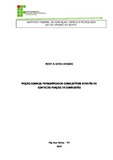FICÇÃO COMBUS: PERSONIFICANDO COMBUSTÍVEIS ATRAVÉS DO CONTEÚDO REAÇÃO DE COMBUSTÃO

Visualizar/
Data
2022-03-29Autor
Aragão, Rony Almeida
http://lattes.cnpq.br/7091749997459903
Metadado
Mostrar registro completoResumo
The expansion of methodologies and pedagogical strategies highlights the
importance of an in-depth study of cognitive development processes, as well as the
educational actions that permeate educational learning environments. Among the
teaching concepts and active methodologies that contribute to the construction of
knowledge in the teaching of natural sciences, we can mention the playful practices
and contextualization that enhance autonomy, creativity and critical thinking about the
scientific concepts worked (SILVA, 2015; BENEDETTI FILHO; CAVAGIS;
CARVALHO, 2020). With this, the action of drawing based on playfulness can provide
the transposition of the knowledge assimilated by the students, also acting as a form
of expression of feelings and meanings (TELLES; SILVA, 2012). Therefore, the
present work aims to analyze the artistic and scientific representations produced by
students about the content of combustion reaction. The project was applied in a 4th
year class (morning) of the integrated technical high school in Informatics of the IFRN
- Pau dos Ferros campus. For the execution of the work, 3 steps were elaborated,
sequenced in: i. presentation of the activity plan and flipped classroom; ii.
development; and iii. socialization and evaluation of fictional characters. In view of the
results obtained, the constructive role of playful, contextualized and drawing practices
in the learning process and conceptual elaboration of the students was observed, as
there was the construction of illustrations and fictional characters with the intrinsic
characteristics of the renewable and non-renewable fuels studied. . Thus, the applied
Didactic Sequence (DS) becomes a viable didactic-pedagogical alternative for the
teaching of natural sciences as for other areas of knowledge, since it facilitates the
understanding and transposition of thoughts and meanings provided by learning in
science.



